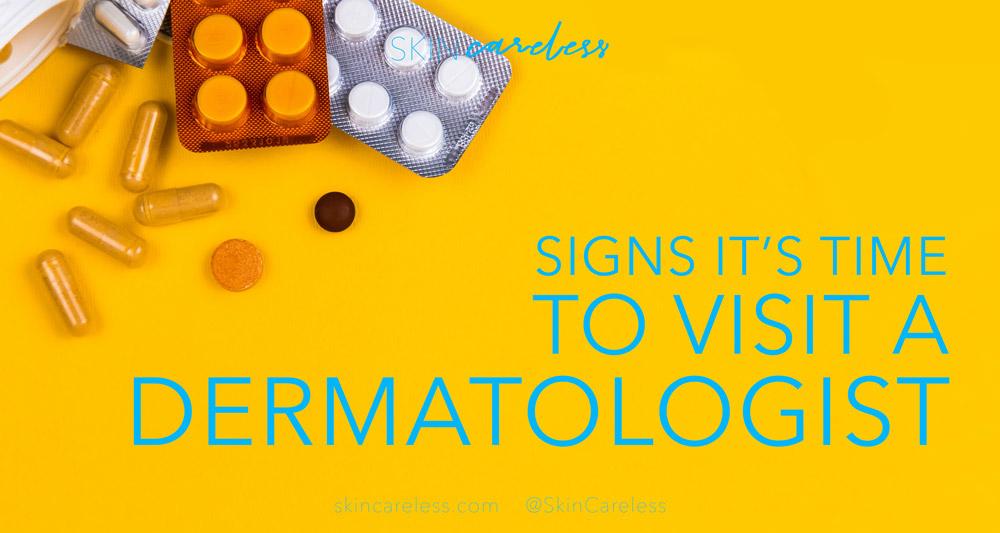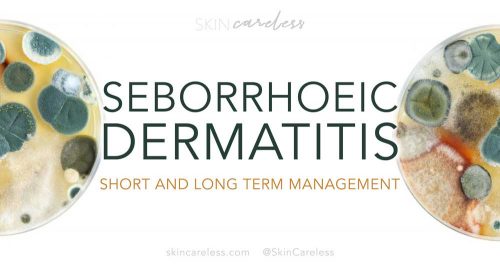Though I’m a huge advocate that a great skin care routine can cure basically all your life problems (maybe that’s an exaggeration…), sometimes, you reach a point where no matter what you do, you need to consult with a professional before your problems can be fixed. Here are some good indicators it’s time to throw in the towel and see a dermatologist or general practitioner.
Your skin is causing you pain
Emotional or physical, painful skin is not normal and shouldn’t be handled alone. If there’s pain, there could be a serious underlying condition like eczema, psoriasis or rosacea. Skin shouldn’t be the focus of your attention 24/7 or the decider of your emotions and plans. Speak to your GP about your issues and they can recommend a dermatologist or a therapist to help overcome your issues.
Despite a great basic routine, your skin seems to be gradually worsening
This could be a sign of an allergy, intolerance, or underlying medical condition that’s unrelated to topical skin care. Such diseases include thyroid disorders, infection, or autoimmune disease. Even if it turns out to be harmless, it’s best to be sure and most dermatologists can check out your products or suggest ways to help bring your skin back to health to give the rest of your routine the best chance possible.
You’ve suddenly got severe ‘acne’ that never existed before
The specific fear in this situation is a sudden hormone imbalance, or worse an MRSA or a fungal infection. Especially if your skin is pus-filled and/or itchy, is spreading, or if you’ve recently had a stay at a hospital (where MRSA runs rampant), get yourself to a dermatologist or even a general practitioner as soon as possible.
Your acne lines up with your period like clockwork
This is for the ladies out there. Hormonal acne is a PITA to treat yourself. Oftentimes, it requires hormonal birth control or other hormone altering medication to improve. Sometimes you only need to take these for a short while and it will help settle things down.
Your acne leaves indented or raised scars
Unlike PIE & PIH, real acne scarring can be serious and nearly irreversible. The kind of acne that causes these scars should be treated by a dermatologist as soon as possible to limit costly scar treatments in the future.
You can never get past a certain amount of improvement
Maybe for you it’s not all bad, you’ve made some progress, but you can never handle that last lingering dry patch or pigmented spot. Again it could be something simple like eczema, or perhaps your acne is just stubborn and you should ramp up the potency of your products to prescription strength. Either way, a dermatologist will help nudge you in the right direction to overcome those last little hurdles.
You’re on the verge of giving up with your skin
Whether it’s being difficult or you just can’t sustain or find the right products, you’ve made no progress. You’ve spent too much money and you’re just about done with skin care completely. A dermatologist has the training and tools to help, and perhaps insight from a third party is exactly what you need.
Remember, seeing a dermatologist isn’t ‘giving up’ nor does it mean that you’re weak. Some people’s skin cannot be treated at home, and there’s no point driving yourself mad trying to make it work. If you fit into one of the categories above, seriously consider professional help.







[…] scarring is very difficult to treat yourself, and will usually require the help of a dermatologist to administer treatments that will resurface and re-level your skin. There are two different […]
[…] If you’re lacking in essential vitamins and minerals in your diet or body, it may be reflected as lacklustre skin. Conditions like iron anemia or vitamin deficiencies will cause your body to prioritise essential organs like kidneys and liver, leaving your skin without. This can cause issues converting oxygen and other enzymatic or repair processes which our skin relies on to make healthy skin cells. If left to worsen, these conditions are extremely dangerous. If your skin is rapidly deteriorating with no apparent external cause, book an appointment with a doctor ASAP. […]
[…] efforts, not everything can be fixed at home. If your rosacea is severely disrupting your life, please see a dermatologist to look into further therapies beyond what over the counter products can offer. Good luck to all of […]
[…] of your suspicions, if you’re showing the telltale signs of any of these conditions, you need to be diagnosed by a dermatologist to know for sure. They will be able to rule out other less common problems, causes or comorbid […]
[…] of your suspicions, if you’re showing the telltale signs of any of these conditions, you need to be diagnosed by a dermatologist to know for sure. They will be able to rule out other less common problems, causes or comorbid […]